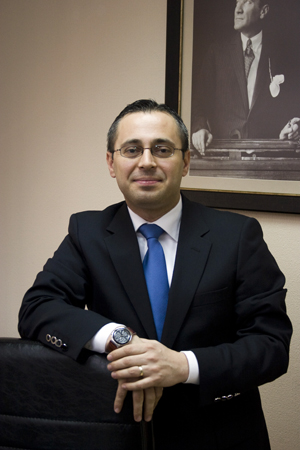Hasan Mutlu of Turkish Airlines talks expansion, sports and the role of a world network.
“In a city like Tokyo, a metropolitan city with 35 million people, the biggest metropolitan city in the world, we should not have an airport which is closing at 11pm,” says Hasan Mutlu, General Manager of Turkish Airlines in Tokyo, of the current operating hours at Narita.
“This city needs an airport that runs 24 hours. I am not in a position to intervene too much, but we are trying.”
“Even if it was just extended until 1am or 2am maybe, more airlines would come, more flights would be handled and more passengers could travel. Then maybe prices would go down. It would not only help the airlines but the Japanese economy and the Ministry of Tourism; many things would be affected positively.”
A few years ago, Turkish Airlines perhaps wouldn’t have considered itself a heavyweight enough name in the industry to be able to make such pushes for expansion. Mutlu, who has been in Japan for just one year, talks about the growth of the company over the last few years and some of the strategies involved in the marketing side of sending Turkish Airlines in the right direction.
“I started in the company in 1997 in Ankara and we were a small-to-mid size or average Eastern European airline with 60 planes, 60 destinations and around 12,000 staff. We were an average carrier owned by the state, losing money.”
Mutlu says the company saw opportunities, firstly from the location of the country. “We could see clearly that Turkey could be a real hub, geographically. We always knew from the beginning the importance of the location. On the one hand we are in the middle of fire, it’s geographically challenging but, even as we are taught in school, the location is very strategic, linking Asia, Africa and Europe. It is in the centre of everything.”
However, Mutlu says, “we needed to build and get even more planes, more cabin crew etc. The weak point of the company was that not too many people knew us; we offered a lot, but had a low profile. When I first went to Nigeria in 2005 and said, ‘I am from Turkey,’ they said, ‘Turkey? What is Turkey?’”
“Actually the movement in the right direction started in 2003, with our new management. When they came to power in the company they reset some things and reorganized, rescheduled and planned a kind of new beginning, investing with the government’s support – airline businesses need the strategic and diplomatic support of the government; even though we are 53% private we are still the flag carrier of the Republic of Turkey. They set the plans for the next 5 years, 10 years and 15 even, until 2023, the 100-year anniversary of the Republic of Turkey. That started to let us gain trust and confidence in ourselves.”
The Turkish Strategy
“Strategically, having confidence was very important. At that time some of us thought there were question marks – I thought, when we were buying planes other companies had cancelled orders for, ‘are we crazy?’ – but after some time we realized that yes, the decisions and policies were right. Those were the right steps and that was the critical point. Then, we had the confidence.”
Turkish Airlines needed to spread the word and Mutlu talks happily of its association with some of the sporting world’s biggest names. The decision to tap the potential reach of global sports stars was an obvious one and the company was quite aggressive, making agreements with the “strongest teams in the world,” Manchester United (Wayne Rooney does a great acting job on a recent safety video) and FC Barcelona. And when a new route into Los Angeles was opened, the company was quick to sign up Kobe Bryant of the LA Lakers basketball team.
Sponsorship is not enough on its own, though, as Mutlu explains. The company needs to be strong. “We need to understand why we need to use sponsorship. Nobody wants to spend millions of dollars on marketing if you have nothing to back it up, you need to have the potential to make the most of it.”
“And sometimes even with money you can’t make an agreement. You cannot make these clubs agree with you with only money. They need something else in return.”
Mutlu talks about brand awareness and the fact that a sponsorship agreement can work both ways. “Also, so many people think we are paying tens of millions of dollars for such sponsorships but if people knew the reality, they would be shocked. Sometimes you can handle things without so much money. Of course if we had oil it might be easier,” Mutlu jokes, “but as it happens we need to work at it and be convincing, it is more complicated.”
Stars of the Sky
The idea is more than just paying to place the brand name on shirts. “We also took the top-eight golf players in the world to Antalya for the Turkish Airlines World Golf tournament in October (Justin Rose beat Lee Westwood by a shot to capture the $1.5m prize in the final) and we sponsor the Turkish Airlines Euroleague, Basketball’s main event.”
Saori Kimura, Japan’s standout volleyball performer at the London Olympics moved to Turkish team, VakifBank TT, recently, further raising the sport’s profile along with the Turkish Airlines name in Japan. If that move was planned, it was a stroke of genius.
“If you are more popular, people and organizations will come to you, and that is happening. They are coming to us and asking.” A growing network across Africa – Mutlu is pleased to see the company making inroads into the “homeland” of British and Dutch airlines – is further helping growth and is part of that.
This is good news not only for the airline, but also for Turkey. “Surprisingly few people know about the reality that one of our main missions is to represent the Republic of Turkey, together with our embassies. People often come to us for information on Turkey and that mission – and taking tourists to Turkey – is often more important than making money.”
Interview by Matthew Holmes
Image: sebra / Shutterstock.com











